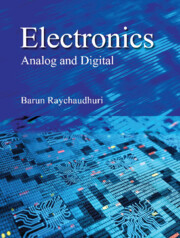Book contents
Summary
Electronics is a subject cultivated at different academic levels of undergraduate and postgraduate science and engineering curriculum. Beyond the classes, it has diversified applications in modern science, technology, economy, society, and daily life. The development of electronics throughout the last century may be treated as a distinct step along the progress of human civilization. This chapter sketches a brief outline of the background, evolution, and widespread applications of electronics. This also introduces the arrangement and relevance of topics in this book.
What Is Electronics
It is understood from our everyday experience that electronics is somehow related to the use of electricity. However, electricity is found in nature also, whereas electronic devices and the use of electricity in those devices are totally man-made. The techniques of electronic devices established several novel aspects in the use of electricity, which were never experienced earlier. Some salient features of electronics are mentioned in the following section.
•Electrical Power Amplification: An electronic device, such as a transistor can be made to amplify voltage and current simultaneously that cannot be achieved with other electrical gadgets, such as a transformer.
•Nonlinear Current–Voltage Relationship: According to Ohm's law, the steady current through a resistor, capacitor, or inductor varies linearly with voltage at a constant temperature. However, the current through electronic devices, such as a diode or a transistor undergoes nonlinear variation with voltage.
•Impedance Transformation: The same electronic device may exhibit different resistances across the input and the output terminals.
All the above characteristics were first realized with triode, a vacuum tube device invented by Lee de Forest in 1906. Therefore the invention of triode may be regarded as the foundation of electronics and we may feel that electronics has been a reliable companion of mankind for more than a century. The continuous research and development throughout this long period has enriched human civilization with innumerable equipment and gadgets like television, mobile phone, satellite communication, Internet, and a metamorphosis of computer from mechanical to electrically operated instrument. The researches on electronics and allied subjects have contributed to other branches of science and technology, and have given rise to new interdisciplinary fields.
- Type
- Chapter
- Information
- Electronics , pp. 1 - 19Publisher: Cambridge University PressPrint publication year: 2023



